- Home
- William Gibson
All Tomorrow's Parties bt-3 Page 17
All Tomorrow's Parties bt-3 Read online
Page 17
History in the older sense was narrative, stories we told ourselves about where we'd come from and what it had been like, and those narratives were revised by each new generation, and indeed always had been. History was plastic, was a matter of interpretation. The digital had not so much changed that as made it too obvious to ignore. History was stored data, subject to manipulation and interpretation.
But the 'history' Laney discovered, through the quirk in his vision induced by having been repeatedly dosed with 5-SB, was something very different. It was that shape comprised of every narrative, every version; it was that shape that only he (as far as he knew) could see.
At first, discovering this, he had attempted to share it with the idoru. Perhaps, if shown, she, this posthuman emergent entity, would simply start to see this way as well. And he had been disappointed when she had finally told him that what he saw was not there for her; that his ability to apprehend the nodal points, those emergent systems of history, was not there, nor did she expect to find it with growth. 'This is human, I think, she'd said, when pressed. 'This is the result of what you are, biochemically, being stressed in a particular way. This is wonderful. This is closed to me.
And shortly after that, as her growing complexity continued to widen the distance he already knew she felt toward Rez, she had come to him and asked him to interpret the data as it flowed around herself and Rez. And he had done this, though reluctantly, out of love. Knowing somehow he would be saying good-bye to her in the process.
The flow around Rez and Rei was ripe with nodal points, particularly at those junctures where queerly occulted data poured steadily in from the Walled City, that semi-mythical otherwhere of outlaw iconoclasts. 'Why have you connected with these people? he'd asked.
'Because I need them, she'd said, 'I don't know why, but I know that I do. The situation does.
'Without them, he'd said, 'you might not have a situation.
'I know. Smiling.
But as his obsession with Harwood had deepened, Laney had grown less comfortable with his trips to the island and their forays together into the fields of data. It had been as though he did not wish her to see him this way, his concentration warped from within, bent toward this one object, this strangely banal object. The sense of Harwood, of the information cloud he generated, swarmed in Laney's dreams. And one morning, waking in the Tokyo hotel in which Lo/Rez kept him billeted, he had decided not to go to work.
And sometime after that, he knew from Yamazaki, and from his own observation of the flow, the idoru had departed Tokyo as well. He had his own theories about that, about her conversations with the denizens (they would have insisted on the term, he thought) of the digitally occluded Walled City, and now, evidently, she was in San Francisco. Although he had known she would be, because of course she had to be. Because San Francisco, he could see in the shape of things, was where the world ended. Was ending. And she was a part of that, and so was he, and Harwood as well.
But something would be decided (was being decided) there. And that was why he dared not sleep. Why he must send the Suit, immaculate and malodorous, with his ankles tarred black, for Regain and more of the blue syrup.
* * *
SOMETIMES, now, beyond the point of exhaustion, he has started to enter, for what may be seconds but can feel like hours or days, some new mode of being.
It is as though he becomes a single retina, distributed evenly across the inner surface of a sphere. Unblinking, he stares, globally, into that eye, seeing that with which he sees, while from a single invisible iris appear individual, card-like images of Harwood, one after another.
Yamazaki has brought him pillows and fresh sleeping bags, bottles of water, an unused change of clothes. He is vaguely aware of these things, but when he becomes the eye that looks in upon itself, and upon the endless string of images, he has no awareness beyond that interiority, infinite and closed.
And part of him asks himself if this is an artifact of his illness, of the 5-SB, or if this vast and inward-looking eye is not in fact some inner aspect of that single shape comprised of every bit of data in the world?
This last he feels is at least partly confirmed by his repeated experience of the eye averting, turning itself inside out, in Moebius spasm, at which point he finds himself, invariably, staring at that indescribable shape.
But now, when he is the eye, he is starting to be aware of someone else watching. Someone else is very interested in those images of Harwood. He feels them register each one.
* * *
THE vintage plastic Gunsmith Cats alarm watch pulls him from the flow. He finds it in the dark and turns off the alarm. He wonders where it came from. The old man?
It is time to phone Rydell in San Francisco. He moves his fingers delicately over the disposables on the cardboard shelf, feeling for the used one with ten minutes left.
How can that be?
40. YELLOW RIBBON
REI Toei could make herself very small.
Six inches tall, she sat on Rydell's pillow, in the salt-frosted plastic dome of his room at the bed-and-breakfast, and he felt like a child.
When she was small, the projection seemed more concentrated; she was brighter, and it made him think of fairies in old anime, those Disney things. She could as easily have had wings, he thought, and fly around, trailing glowing dust if she wanted. But she only sat there, even more perfect at six inches tall, and talked with him.
And when he'd close his eyes, not intending to sleep but only to rest them, he could hear that her voice was actually coming from the projector at the foot of his bed. She was telling him about Rez, the singer she'd wanted to marry, and why that hadn't worked, but it was difficult to follow. Rez had been very interested in Rez, Rydell gathered, and not much else, and Rei Toei had become more interested in other people (or, he guessed, if you were her, in other things). But he kept slipping out of focus, falling asleep really, and her voice was so beautiful.
Before he'd stretched out here, and she'd shown him how she could get small, he'd pulled the chicken-wire gate into place and spread the curtains that were thumbtacked to it, some kind of faded fabric printed with a pattern of ornate keys and strange, long-necked cats (he thought they were).
He didn't know how long the sunglasses had been ringing, and it took him several rings to locate his jacket in the dark. He was fully dressed, shoes and all, otherwise, and he knew he'd been deep asleep.
'Hello? He put the glasses on with his left hand. With his right he reached up and touched the ceiling. It's paneling gave, slightly, when he did that, so he didn't do it again.
'Where are you? It was Laney.
'Bed-and-breakfast, Rydell told him. With the sunglasses on, it was totally dark. He watched the low spark of his own optic nerve, colors without names.
'Did you get the cables?
'Yeah, Rydell said. He remembered being harsh with the sumo kid and felt stupid. He'd lost it. That claustro thing he got in crowds sometimes. Tara-MayAllenby had told him that was called agoraphobia, and it meant 'fear of the mall, but it wasn't actually malls that did it to him. But he couldn't stand those little under-lip beards either. 'Two of them.
'Use them yet?
'Just the power, Rydell said. 'The other one, I don't know what it jacks with.
'Neither do I, said Laney. 'Is she there?
'She was, Rydell said, looking around in the dark for his fairy star, then remembering he was wearing sunglasses.
His hand found a switch that dangled from a wire near his head. He clicked it. A bare fifty-watt bulb came on. He slid the glasses down his nose and peered over them, finding the projector still there and still plugged in. 'The thermos-thing's still here.
'Don't let that out of your sight, Laney said. 'Or the cables. I don't know what we need her to do there, but it's all around her.
'What's all around her?
'The change.
'Laney, she said you told her the world was going to end.
'Is going to end, Laney
corrected.
'Why'd you tell her that?
Laney sighed, the deep end of his sigh becoming a cough, which he seemed to choke off. 'As we know it, okay? he managed. 'As we know it. And that's all I or anyone else can tell you about that. It's not what I want you thinking about. You're working for me, remember?
And you're crazy, Rydell thought, but I've got your credit chip in my pocket. 'Okay, he said, 'what's next?
'You have to go to the site of a double homicide, one that took place last night, on the bridge.
'What do you want me to try to find out?
'Nothing, Laney said. 'Just look like you're trying to find something out. Pretend. Like you're investigating. Call me when you're ready to go, I'll give you the GPS fix for the spot.
'Hey, Rydell said, 'what if I do find something out?
'Then call me.
'Don't hang up, Rydell said. 'How come you haven't been in touch with her, Laney? She said you two were separated.
'The people who, well, 'own' her, that's not quite the term, really, but they'd like to talk to me, because she's missing. And the Lo/Rez people too. So I need to be incommunicado at the moment, as far as they're concerned. But she hasn't tried to reach me, Rydell. She'll be able to, when she needs to. He hung up.
Took the glasses off, left them folded on the pillow, and crawled to the end of the bed. 'Hey, he said to the thermos-thing, 'you there? Nothing.
He started getting himself together. He unpacked his duffel, used the switchblade to cut a couple of slits in it, took off his nylon belt and threaded it through the slits, using it as a strap, so he could sling the bag over his shoulder.
'Hey, he said again to the thermos-thing, 'you there? I'm gonna unplug you now. He hesitated, did. He put it in the duffel, along with the power cable, the other cable, and his Lucky Dragon fanny pack, this last because the thing had already saved his ass once, and it might be lucky. He put his nylon jacket on, put the sunglasses in his pocket, and, as an afterthought, gingerly put the switchblade in his right front trouser pocket. Then he imagined it opening there, thought about its lack of a safety catch, and, even more gingerly, fished it out and put it in the side pocket of his jacket.
* * *
AND found the place without too much trouble, though Laney's mode of GPS-by-phone was pretty basic. Laney had a fix on the spot (Rydell had no idea how) but no map of the bridge, so he triangulated Rydell's sunglasses somehow and told him to walk back toward San Francisco, lower level, keep walking, keep walking, getting warmer. Okay, turn right.
Which had left Rydell facing a blank plywood partition plastered with rain-stained handbills, in a European language he didn't recognize, for a concert by someone named Ottoman Badchair. He described this to Laney.
'That isn't it, Laney said, 'but you're really close.
There was a shop next door, closed, and he couldn't figure out what it sold when it was open, and then a gap. Rolls of plastic back in there. Lumber. Someone was building another shop, he thought. If this was it, the crime scene, there ought to be a yellow plastic ribbon with SFPD stapled up, but then he remembered that the police didn't come out here all that much, and he wondered what they did when they had a body to dispose of. Flipping them over the side wouldn't make the city too happy, although of course there was no way the city could prove a particular corpse had come off the bridge. Still, it bothered Rydell that there wasn't any yellow ribbon. He guessed he thought of it as a mark of respect.
He moved in, edging past the rolls of plastic, climbing over a low stack of plywood, and spotted, in the harsh light slung from the scavenged fluorescents closer to the pedestrian stroll, two frosty-looking white marks, something aerosoled over two darker stains, and he knew what that was. Kil'Z, this stuff you sprayed where bodily fluids had gotten out, in case the person who'd lost them was seropositive. He knew what Kil'Z looked like over blood, and this was that.
Not much of a crime scene. He stood there staring down at it and wondering how Laney expected him to look like he was conducting an investigation. He put the duffel with Rei Toei's projector down on the rolls of plastic.
Kil'Z residue was fairly waterproof, so the rain hadn't washed it away. But then he knew that the victims, whoever they had been, had died the night before.
He felt like an idiot. He really had wanted to be a cop once, and he'd dreamed of crossing the yellow line and looking at the scene. And being able to do something. And now here he was.
He took out the glasses and called Laney. But now Laney, in whatever fine hotel he might be in, in Tokyo, wouldn't answer.
'No shit, Sherlock, Rydell said to himself, listening to a phone ring in Tokyo.
'You do have a sense of humor, Harwood says, behind him. 'I know it.
Leaning closer to the window, looking down. Foreshortened perspective up the side of this obelisk, this pyramid so-called, and midway the dark bulge of that Japanese material, placed to counter old quake damage. This is new, replacing earlier splines of polycarbon, and the subject of architectural and aesthetic scandal. Briefly fascinated, he watches as reflections of the lights of surrounding buildings shudder slightly, the thing's glossy surface tensing in response to winds he cannot feel. The truss is alive.
Turning to face Harwood, who is seated behind a broad dark plain of nonreflective wood, across which an accumulation of architectural
41. TRANSAM
'HIS name is Rydell, Harwood says. 'Image matching gave us that immediately. He was briefly associated with Cops in Trouble.
'Associated with whom? The knife, with its sheath and harness, was secured in a twilit alcove off the central elevator stack, approximately eight hundred feet below.
'Cops in Trouble, Harwood says. 'A cultural treasure. Don't you watch television?
'No. He is looking east, from the forty-eighth and ultimate floor of the city's tallest building, toward the shadow of the ruined Embarcadero, the gypsy glow of the bridge, the feral darkness of Treasure Island.
Stepping closer to the window, he touches his belt. Stitched between two layers of black calf is concealed a ribbon of a very particular, very expensive material. Under certain circumstances, it ceases to behave as though it were some loosely woven, tissue-thin fabric, something a child might accidentally pull to pieces, and becomes instead thirty inches of something limber, double-edged, and very sharp. Its texture, in that state, its sleek translucency, has reminded him of fresh cuttlebone models and hillocks of documents suggest the courses of imaginary rivers: a topography in which might be read change in the world beyond the window, if meanings were known, and one were sufficiently concerned with outcomes.
Harwood's eyes are the most present thing about him, the rest giving an impression of existing at one remove, in some other and unspecific dimension. A tall man, he seems to occupy relatively little space, communicating from elsewhere via deliberately constricted channels. He is slender, with that agelessness of the aging rich, his long face free of tension. His eyes, enlarged by archaic lenses, are seldom still. 'Why do you pretend to not be interested in this former policeman visiting the site of your recent activities? On his wrist, gold and titanium catches the light; some multitasking bauble with intricate displays.
'I don't pretend. On the large flatscreen that stands to the left of the desk, four cameras present angles on a tall, sturdy-looking man who stands, chin down, as if brooding. The cameras would be no larger than roaches, but the four images, in spite of inadequate light, offer excellent resolution. 'Who placed these cameras?
'My bright young things.
'Why?
'Against exactly this eventuality: that someone might visit the site of these two utterly forgettable deaths and stand there, thinking. Look at him. He's thinking.
'He looks unhappy.
'He's trying to imagine you.
'You imagine he is.
'The fact that he's found his way to that spot at all is indicative of knowledge and motive. He knows that two men died there.
Amid th
e various models on Harwood's desk stands one in glossy red and white, rendered with functioning miniature video screens on the trademark pylon. Tiny images move and change there, in liquid crystal.
'Do you own the company that built this thing? indicating the model with his index finger.
The eyes behind Hardwood's glasses register surprise, from their peculiar distance. Then interest. 'No. We advise them. We are a public relations firm. We did, I believe, advise on impact. We advised the city as well.
'It's horrible.
'Yes, says Harwood, 'aesthetically, I agree. And that was an expressed concern of the municipal authorities. But our studies indicated that positioning it there would encourage walk-on tourism, and that is a crucial aspect of normalization.
'Normalization?
'There is an ongoing initiative to bring the bridge community back into the fold, as it were. But the issue is sensitive. A matter of image really, and that of course is where we come in. Harwood smiles. 'A number of major cities have these autonomous zones, and how a given city chooses to deal with the situation can impact drastically on that city's image. Copenhagen, for instance, was one of the first, and has done very well. Atlanta, I suppose, would be the classic example of what not to do. Harwood blinks. 'It's what we do now instead of bohemias, he says.
'Instead of what?
'Bohemias. Alternative subcultures. They were a crucial aspect of industrial civilization in the two previous centuries. They were where industrial civilization went to dream. A sort of unconscious R&D, exploring alternate societal strategies. Each one would have a dress code, characteristic forms of artistic expression, a substance or substances of choice, and a set of sexual values at odds with those of the culture at large. And they did, frequently, have locales with which they became associated. But they became extinct.
'Extinct?
'We started picking them before they could ripen. A certain crucial growing period was lost, as marketing evolved and the mechanisms of recommodification became quicker, more rapacious. Authentic subcultures required backwaters, and time, and there are no more backwaters. They went the way of geography in general. Autonomous zones do offer a certain insulation from the monoculture, but they seem not to lend themselves to recommodification, not in the same way. We don't know why exactly. The little images shift, flickering.

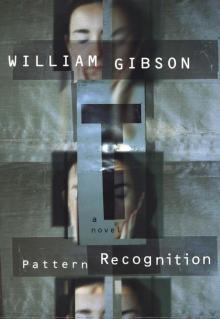 Pattern Recognition
Pattern Recognition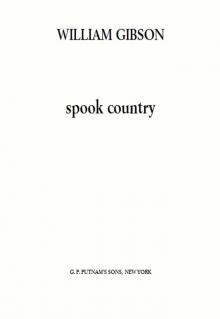 Spook Country
Spook Country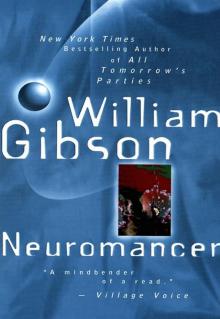 Neuromancer
Neuromancer Skinner's Room
Skinner's Room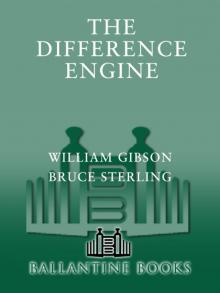 The Difference Engine
The Difference Engine Mona Lisa Overdrive
Mona Lisa Overdrive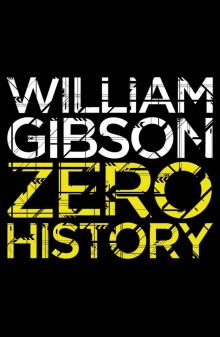 Zero History
Zero History The Peripheral
The Peripheral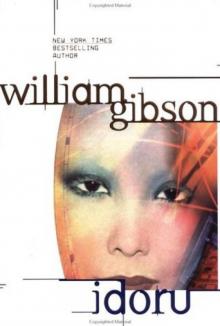 Idoru
Idoru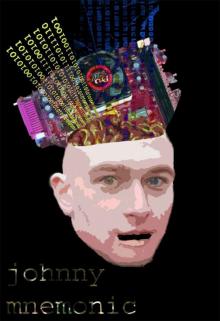 Johnny Mnemonic
Johnny Mnemonic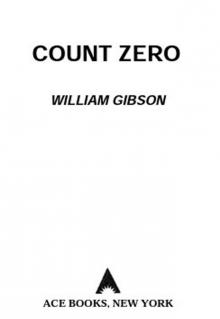 Count Zero
Count Zero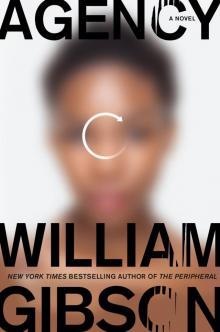 Agency
Agency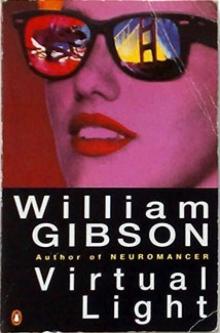 Virtual Light
Virtual Light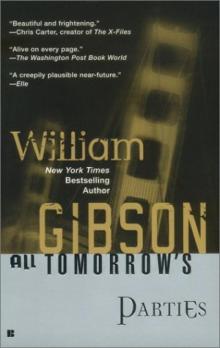 All Tomorrow's Parties
All Tomorrow's Parties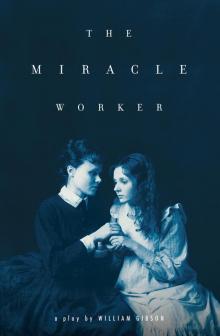 The Miracle Worker
The Miracle Worker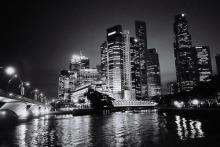 Disneyland with the Death Penalty
Disneyland with the Death Penalty Idoru tb-2
Idoru tb-2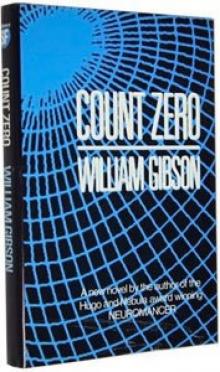 Count Zero s-2
Count Zero s-2 The Gernsback Continuum
The Gernsback Continuum New Rose hotel (tales)
New Rose hotel (tales)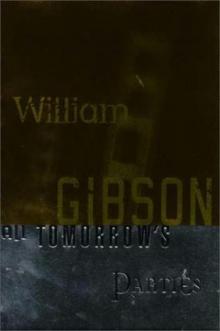 All Tomorrow's Parties bt-3
All Tomorrow's Parties bt-3 Hinterlands
Hinterlands Thirteen Views Of A Cardboard City
Thirteen Views Of A Cardboard City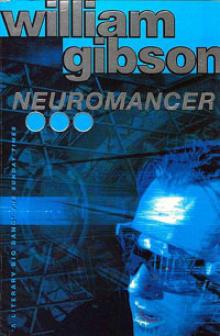 Neuromancer ts-1
Neuromancer ts-1 Virtual light b-1
Virtual light b-1